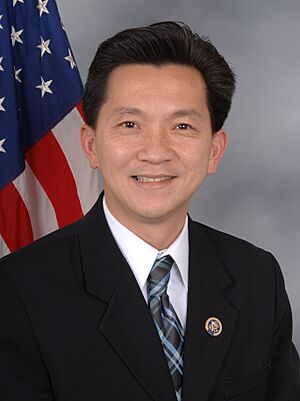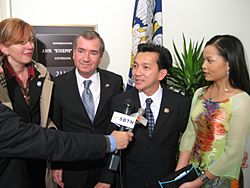Joseph Cao facts for kids
Quick facts for kids
Joseph Cao
|
|
|---|---|

Official portrait, 2009
|
|
| Member of the U.S. House of Representatives from Louisiana's 2nd district |
|
| In office January 3, 2009 – January 3, 2011 |
|
| Preceded by | William J. Jefferson |
| Succeeded by | Cedric Richmond |
| Personal details | |
| Born |
Cao Quang Ánh
March 13, 1967 Saigon, South Vietnam (current-day Ho Chi Minh City) |
| Political party | Republican |
| Spouse | Kate Hoang |
| Children | 3 |
| Education | Baylor University (BS) Fordham University (MA) Loyola University New Orleans (JD) |
Ánh Quang "Joseph" Cao (born March 13, 1967) is a Vietnamese-American politician who served in the U.S. House of Representatives. He represented Louisiana's 2nd congressional district from 2009 to 2011.
As a member of the Republican Party, Cao made history as the first Vietnamese American to ever be elected to the U.S. Congress.
After his term in Congress, Cao ran for other political offices. In 2011, he entered the race for Attorney General of Louisiana but later withdrew. In 2015, he ran for a seat in the U.S. Senate.
Contents
Early Life and Journey to America
Joseph Cao was born as Cao Quang Ánh in Saigon, South Vietnam, in 1967. His father was a lieutenant in the South Vietnamese Army. When the Vietnam War ended in 1975, his father was captured.
His mother made the difficult decision to send Joseph, who was only eight years old, and two of his siblings to escape the country with their uncle. She stayed behind with his other five siblings. His father was held in a re-education camp for seven years.
In 1975, Cao and his siblings arrived in the United States as refugees. They settled in Houston, Texas. His father was finally released in 1982 and was able to join his family in Houston.
Education and Career Path
Cao grew up in Texas and went to public schools. He earned a degree in physics from Baylor University. For a while, he studied to become a Jesuit priest but decided it was not the right path for him.
He then earned a master's degree in philosophy from Fordham University in New York City. Later, he moved to New Orleans and earned a law degree from Loyola University School of Law.
After law school, Cao opened his own law office. He specialized in immigration law, helping people who were moving to the United States. He also volunteered with an organization called Boat People SOS, which helped Vietnamese refugees and immigrants.
The government's response to Hurricane Katrina in 2005 inspired Cao to become more involved in politics to help his community.
Serving in the U.S. Congress
Cao's election to Congress was historic. He was the first person born in Vietnam to become a member of the U.S. Congress. He was also the first Republican to represent his district since 1890. His district usually voted for the Democratic Party, so his victory was a big surprise.
He was sworn into office on January 6, 2009. In one of his first speeches, he supported a bill to create a "Welcome Home Vietnam Veterans Day" to honor soldiers who fought in the Vietnam War.
Working for His District
Cao worked hard to get federal money for projects in his district, which was still recovering from Hurricane Katrina. He asked for $1.2 billion for various projects. He also worked with other Louisiana politicians, like Senator Mary Landrieu, to get help for the area.
He was very critical of the Federal Emergency Management Agency (FEMA), the government agency in charge of disaster response. He felt FEMA was not doing enough to help the people of New Orleans. He called for investigations into the agency's local office and pushed for new leadership.
Key Votes and Political Views
Cao was known as a moderate Republican, meaning he did not always vote along party lines.
- Health Care: He was the only Republican who voted for an early version of the Patient Protection and Affordable Care Act (often called Obamacare). However, he voted against the final bill because he had concerns about some of its rules.
- Military Policy: He was one of only 15 Republicans who voted to end "Don't Ask, Don't Tell". This was a policy that prevented openly gay people from serving in the military.
- Stimulus Package: He voted against President Obama's 2009 economic stimulus package. He said his district, which was badly damaged by hurricanes, was not getting enough money from the plan.
A 2011 study by the National Journal called him the most liberal Republican in the House of Representatives at the time.
Committee Assignments
In Congress, members work on small groups called committees to focus on specific topics. Cao was assigned to:
- Committee on Homeland Security
- Committee on Transportation and Infrastructure
- Committee on Oversight and Government Reform
Political Campaigns
2008 Election for Congress
In 2008, Cao ran against the current representative, William J. Jefferson. Jefferson was facing serious problems at the time, which made him unpopular with some voters.
Cao received support from many local leaders and newspapers. His victory was seen as a major upset because his district had a long history of electing Democrats. He won with just under 50% of the vote. His win was celebrated by many who wanted a change in leadership for Louisiana.
2010 Re-election Campaign
Because his district was so heavily Democratic, it was very difficult for Cao to win a second term. In the 2010 election, he ran against Cedric Richmond, a Democrat.
Although some local Democrats supported Cao, he lost the election to Richmond. He was one of only two Republican representatives to lose their seats in that election year.
Personal Life
Cao is married to Hieu Phuong "Kate" Hoang, who is a pharmacist. They met at their church in New Orleans. The couple has two daughters and lives in the Venetian Isles neighborhood of New Orleans.
Cao is a devout Catholic and has been very involved in his church community. He served on the board of a group connected to his church that helps Vietnamese-Americans with hurricane relief.
See also
 In Spanish: Joseph Cao para niños
In Spanish: Joseph Cao para niños
- Vietnamese in New Orleans
- List of Asian Americans and Pacific Islands Americans in the United States Congress


